|
|
|
Sort Order |
|
|
|
Items / Page
|
|
|
|
|
|
|
| Srl | Item |
| 1 |
ID:
177270
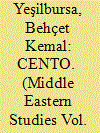

|
|
|
|
|
| Summary/Abstract |
This article sets out to explore the formation of the Central Treaty Organisation (CENTO), 1959-1979. It seeks to determine the aims with which CENTO was established, its failings, and the struggle that was undertaken against it by hostile countries. It examines the events surrounding its formation, development and collapse, and Anglo-American attempts to contain the Soviet Union in the Middle East. It also deals with British and American post-war defence policies in the Middle East and their collective defence projects in the region, such as the Middle East Command, the Northern Tier and Baghdad Pact, which led to CENTO. In addition, it looks at the policies of the local members and the organisation’s internal structure. It poses questions of how the members of CENTO perceived the question of Middle East defence, what their basic aims were, and what problems they faced while trying to achieve these aims and implementing their chosen solutions. CENTO had its genesis in the Pact of Mutual Cooperation signed by Turkey and Iraq in Baghdad on 24 February 1955. Britain joined the Baghdad Pact on 5 April 1955, followed by Pakistan on 23 September and Iran on 3 November of the same year. While the United States strongly supported the creation of the Pact, for purely technical reasons of budgeting procedures, it never took up formal membership. On 14 July 1958, there was a military coup in Iraq, led by Brigadier Kassem, in which King Faisal, the Crown Prince, and the Prime Minister, Nuri Said, were all murdered. The new military regime did not immediately withdraw from membership, but it no longer participated in the work of the alliance. For the Baghdad Pact as a whole, the result was serious but not fatal. In October 1958, the Pact headquarters was moved from Baghdad to Ankara. On 24 March 1959, Kassem withdrew Iraq from the alliance and on 19 August 1959, it was announced in Ankara that the name had been changed from the ‘Baghdad Pact’ to the ‘Central Treaty Organisation’, abbreviated as CENTO. The membership remained unchanged: namely Turkey, Iran, Pakistan and Britain, with the US as a full participant. CENTO survived until 1979 when Iran withdrew from CENTO on 11 March following the Islamic revolution, claiming that ‘it only protected interests of the imperialist states’. Pakistan followed suit on 12 March, because it believed that ‘the organisation was not able to protect Pakistan’s security’; and the next day Turkey proclaimed that ‘CENTO had in effect lost its function in the region’. The history of CENTO has not so far been extensively researched and, as a result, the formation of CENTO and its overall aims are still surrounded by controversy. There are no comprehensive studies on the subject, though general information is given in a number of scholarly works. This article is based upon a range of primary and secondary sources. Much of material for this study was gathered from the National Archives, the United Kingdom.
|
|
|
|
|
|
|
|
|
|
|
|
|
|
|
|
| 2 |
ID:
177272
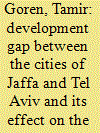

|
|
|
|
|
| Summary/Abstract |
At the time of the British Mandate in Palestine the development of Tel Aviv, which the Jaffa Arabs regarded as the realization of the Zionist enterprise, was perceived as a real threat to Jaffa’s future. The two cities’ geographic proximity threw into bold relief the differences between the two levels of development. As the years passed the two cities’ development demonstrated Tel Aviv’s supremacy over Jaffa. From the years of the Arab revolt (1936-1939) the gap between the development of Tel Aviv and of Jaffa inexorably widened. By time the Mandate ended Jaffa’s condition had so deteriorated that the need to narrow the gap had become urgent. Jaffa had to be transformed into a modern city, but also – indeed principally – to be restored to its former strength and status in the context of the worsening Arab-Jewish conflict. The will to achieve this aim intensified as long as Tel Aviv continued to flourish. The article evaluates how far the chasm between the two cities in their development influenced Jaffa’s condition in the declining years of the Mandate. It shows that it damaged Jaffa, being a significant factor reducing its status as an urban center.
|
|
|
|
|
|
|
|
|
|
|
|
|
|
|
|
| 3 |
ID:
177273
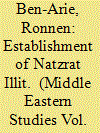

|
|
|
|
|
| Summary/Abstract |
Natzrat Illit (‘Upper Nazareth’) was one of the dozens of ‘new towns’ established by the state of Israel during the 1950s, following the 1948 war. However, because of its unique location, in the midst of a region widely inhabited by a Palestinian population, and the specific objectives of its establishment, the penetration of a Jewish population into the region and the reinforcement of control over Nazareth, the only Palestinian city that survived the war and remained within the borders of the newly established state, it demanded particular means and forms of action. Based on archival materials, this article delineates the particular methods and practices used to confront and overcome the specific conditions set for the establishment of Natzrat Illit. These methods and practices will later become advantageous when similar objectives would be set for the state-led expansive settlement project into new territories.
|
|
|
|
|
|
|
|
|
|
|
|
|
|
|
|
| 4 |
ID:
177279
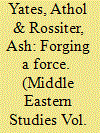

|
|
|
|
|
| Summary/Abstract |
It has long been observed that the development of professional security institutions is a key stage in modern state formation. Leaders of many proto-states embarking on programs of rapid development – such as many of the rulers of the Arab Gulf States in the 1960s – have brought in foreign professional expertise to assist in building up fledgling state institutions, including militaries, police forces and intelligence services. We know little, however, about the relationship between ruler and these key expatriates performing these functions. To help fill this lacuna, this article examines the first three expatriate professional heads of Abu Dhabi Police over the period 1959-68 and their relationship with their paymasters – first Shaikh Shakhbut bin Sultan Al Nahyan, then his brother, Shaikh Zayed. It details the difficulties these professional expatriates faced in operating within this ruler-dominated political-administration system. We believe observations made in this study have relevance to the contemporary Gulf, where governments continue to employ highly skilled expatriates in their security institutions and much else besides.
|
|
|
|
|
|
|
|
|
|
|
|
|
|
|
|
| 5 |
ID:
177274


|
|
|
|
|
| Summary/Abstract |
Between 1948 and1967, Muslim cemeteries in the State of Israel saw many changes. The present article examines how the state elected to treat the many deserted Muslim cemeteries within its limits: should these cemeteries be protected by the Jewish state? Or should they be demolished, their remains removed from the evolving Israeli landscape? Israeli archival sources facilitate the study of this phenomenon, highlighting the duplicitous nature of the Israeli bureaucratic approach toward Muslim cemeteries. Charged with safeguarding the sites, the Ministry of Religious Affairs’ Muslim and Druze Department attempted to confront the state’s propensity to evacuate the cemeteries and use the vacant space for different needs. Yet, at the same time, other Israeli actors – various governmental offices, municipalities, and even the army – played a part in the process of neglect, damage, and appropriation that these cemeteries suffered.
|
|
|
|
|
|
|
|
|
|
|
|
|
|
|
|
| 6 |
ID:
177278
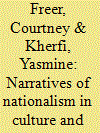

|
|
|
|
|
| Summary/Abstract |
Over the past decade, all six states of the Gulf Cooperation Council (GCC) have invested considerably in the development of their local heritage industries. In parallel, these states have expanded their efforts at fostering home-grown nationalism. What scholarship exists on the topic of expansion of the heritage industry tends to be anthropological, sociological, or linked to museum studies, while literature on nationalism tends to remain in the realm of political science. This article addresses disciplinary gaps by taking special account of the state’s role in producing heritage and culture to foster nationalism. This development has been neglected or taken for granted in past studies of heritage production and preservation in the Gulf, and therefore deserves more substantial academic inquiry. In the first part of this article, we assess ways in which the Arabian Peninsula provides a unique environment for the study of heritage sites, before looking at how different actors, including grassroots initiatives and more substantially the state, engage in heritage production to promote select narratives about citizens’ shared history and common identity. In so doing, this piece offers a critical reflection on the ongoing processes through which heritage-making, political power, and nation-building are uniquely intertwined in the GCC.
|
|
|
|
|
|
|
|
|
|
|
|
|
|
|
|
| 7 |
ID:
177267
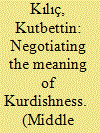

|
|
|
|
|
| Summary/Abstract |
This article examines the process of the construction of a secular Kurdish perception of identity by Kurdish political elites since the 1960s. It argues that despite the variance in group-making tactics employed by different Kurdish political groups or figures, something has remained unchanged: the construction and promotion of a secular Kurdish identity perception, which dissociates Islam from the cultural content of Kurdish ethnic identity. Kurdish political and intellectual elites in Turkey, during and after the 1960s, took a radical stance against religion and started to construct and promote a Kurdish ethnic identity perception based only on certain myths, ruling out Islam from the cultural content of Kurdish ethnic identity. Although Kurdish political elites adopted a friendlier language towards religion after the 2000s, in response to certain political and practical challenges, they never gave up on this secular Kurdish identity perception.
|
|
|
|
|
|
|
|
|
|
|
|
|
|
|
|
| 8 |
ID:
180290
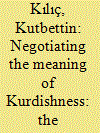

|
|
|
|
|
| Summary/Abstract |
This article examines the process of the construction of a secular Kurdish perception of identity by Kurdish political elites since the 1960s. It argues that despite the variance in group-making tactics employed by different Kurdish political groups or figures, something has remained unchanged: the construction and promotion of a secular Kurdish identity perception, which dissociates Islam from the cultural content of Kurdish ethnic identity. Kurdish political and intellectual elites in Turkey, during and after the 1960s, took a radical stance against religion and started to construct and promote a Kurdish ethnic identity perception based only on certain myths, ruling out Islam from the cultural content of Kurdish ethnic identity. Although Kurdish political elites adopted a friendlier language towards religion after the 2000s, in response to certain political and practical challenges, they never gave up on this secular Kurdish identity perception.
|
|
|
|
|
|
|
|
|
|
|
|
|
|
|
|
| 9 |
ID:
180291
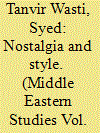

|
|
|
|
|
| Summary/Abstract |
Abdülhak Şinâsî Hisar, a famous writer whose active career may be said to have spanned over the first 60 years of the 20th century, is celebrated within Turkey for his inimitable prose style, steeped in nostalgia and expressed with great elegance and charm. His three short novels, based both on his childhood memories of life and on depicting characters he observed in an Ottoman capital that once had a sparkling civilization, and his biographies of major writers who were his friends, along with his essays on literary criticism and his prolific journalistic output, have assured him a place in the front rank of Turkish literary figures.
|
|
|
|
|
|
|
|
|
|
|
|
|
|
|
|
| 10 |
ID:
177268
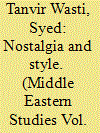

|
|
|
|
|
| Summary/Abstract |
Abdülhak Şinâsî Hisar, a famous writer whose active career may be said to have spanned over the first 60 years of the 20th century, is celebrated within Turkey for his inimitable prose style, steeped in nostalgia and expressed with great elegance and charm. His three short novels, based both on his childhood memories of life and on depicting characters he observed in an Ottoman capital that once had a sparkling civilization, and his biographies of major writers who were his friends, along with his essays on literary criticism and his prolific journalistic output, have assured him a place in the front rank of Turkish literary figures.
|
|
|
|
|
|
|
|
|
|
|
|
|
|
|
|
| 11 |
ID:
177266
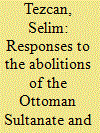

|
|
|
|
|
| Summary/Abstract |
This is a study of the responses of the Arabic and Hebrew press of Palestine to the abolitions of the Ottoman Sultanate and Caliphate. It is based on a comparative examination of the contemporary coverage of the events by the Arabic newspapers al-Karmil and Filastin and by the Hebrew newspapers Doar ha-Yom and Haaretz. The analysis yields valuable insights about how the Yishuv and the Palestinians viewed the abolitions of the Sultanate and Caliphate, the contemporary significance of these institutions, Kemalist Turkey, the rival population in Palestine, and Sharif Husayn. Mainly, it shows that the Hebrew press hailed the abolitions as revolutionary developments that would pave the road before the modernization of not only Turkey but the whole of Asia, while the Arabic press considered this too momentous a matter to be decided by Turkey alone and predicted adverse consequences for both that country and the East.
|
|
|
|
|
|
|
|
|
|
|
|
|
|
|
|
| 12 |
ID:
180289
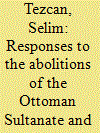

|
|
|
|
|
| Summary/Abstract |
This is a study of the responses of the Arabic and Hebrew press of Palestine to the abolitions of the Ottoman Sultanate and Caliphate. It is based on a comparative examination of the contemporary coverage of the events by the Arabic newspapers al-Karmil and Filastin and by the Hebrew newspapers Doar ha-Yom and Haaretz. The analysis yields valuable insights about how the Yishuv and the Palestinians viewed the abolitions of the Sultanate and Caliphate, the contemporary significance of these institutions, Kemalist Turkey, the rival population in Palestine, and Sharif Husayn. Mainly, it shows that the Hebrew press hailed the abolitions as revolutionary developments that would pave the road before the modernization of not only Turkey but the whole of Asia, while the Arabic press considered this too momentous a matter to be decided by Turkey alone and predicted adverse consequences for both that country and the East.
|
|
|
|
|
|
|
|
|
|
|
|
|
|
|
|
| 13 |
ID:
180287


|
|
|
|
|
| Summary/Abstract |
The Ottoman central government attempted to improve its control over the distant regions of the empire in the nineteenth century with the help of the ulema. The ulema had deep networks in rural communities and profound influence on Muslim subjects. They thereby played a leading role in maintaining public order in the provinces. They used their influence to achieve compromises, integrate different elements of society, and prevent riots, turmoil, anarchy and conflict, thereby allowing the government to peacefully manage many conflicts within society. In this respect, the ulema’s effect on conflict resolution processes and their occasional partnership with official authorities and society will constitute the content of this article. In other words, this article will try to demonstrate the importance and influence of the Ottoman ulema during the reform period by showing how they helped to extend the central government’s authority in distant regions of the empire, where its management capacity had been weak.
|
|
|
|
|
|
|
|
|
|
|
|
|
|
|
|
| 14 |
ID:
177264


|
|
|
|
|
| Summary/Abstract |
The Ottoman central government attempted to improve its control over the distant regions of the empire in the nineteenth century with the help of the ulema. The ulema had deep networks in rural communities and profound influence on Muslim subjects. They thereby played a leading role in maintaining public order in the provinces. They used their influence to achieve compromises, integrate different elements of society, and prevent riots, turmoil, anarchy and conflict, thereby allowing the government to peacefully manage many conflicts within society. In this respect, the ulema’s effect on conflict resolution processes and their occasional partnership with official authorities and society will constitute the content of this article. In other words, this article will try to demonstrate the importance and influence of the Ottoman ulema during the reform period by showing how they helped to extend the central government’s authority in distant regions of the empire, where its management capacity had been weak.
|
|
|
|
|
|
|
|
|
|
|
|
|
|
|
|
| 15 |
ID:
177271


|
|
|
|
|
| Summary/Abstract |
This article reviews and discusses the Russian foreign policy towards several countries in the Post-Soviet Space (Tajikistan, Ukraine and Georgia), and the Middle East (Syria). The Russian policy towards its near abroad shows elements of both (neo-)realism and constructivism. A realist perspective of Russian foreign policy seems evident as Russia pursues its own national (or imperial) geopolitical interest. However, it may not explain the Russian interventions satisfactorily. Analysing Russia’s intervention in these conflicts, it is important to look also at Russia’s own geopolitical vision; i.e. how Russia views the world, notably its near abroad, and Russia’s place, role or even mission in it. Russia has reacted to the NATO and European Union (EU) enlargements in its (former) geopolitical spheres of influence and has helped its ally Bashar Assad remain in power in Syria. The conflict in Ukraine is not irrelevant to that in Syria and the Russian experience in Chechnya and Tajikistan may have codetermined Russian intervention in Syria.
|
|
|
|
|
|
|
|
|
|
|
|
|
|
|
|
| 16 |
ID:
177280
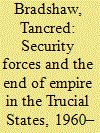

|
|
|
|
|
| Summary/Abstract |
One of the notable characteristics of Britain’s imperial role in the Trucial States (United Arab Emirates from 1971) was the establishment of armed forces and security services. The Trucial Oman Scouts (TOS) were the most important proto army in the sheikhdoms. During the last decade of the pax Britannica in the Trucial States competing units were also established in the region. The Foreign Office also sought to counter the potential threat of opposition groups inspired by several models of Arab nationalism by developing the internal security forces of the sheikhdoms. The establishment of these military organisations was attractive because they were much cheaper than deploying British forces. In January 1968 the Labour government decided to withdraw from East of Suez. The armies of the Trucial States formed the basis of the UAE armed forces, and British played a central role in creating the security state in the Emirates.
|
|
|
|
|
|
|
|
|
|
|
|
|
|
|
|
| 17 |
ID:
180303
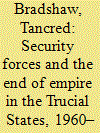

|
|
|
|
|
| Summary/Abstract |
One of the notable characteristics of Britain’s imperial role in the Trucial States (United Arab Emirates from 1971) was the establishment of armed forces and security services. The Trucial Oman Scouts (TOS) were the most important proto army in the sheikhdoms. During the last decade of the pax Britannica in the Trucial States competing units were also established in the region. The Foreign Office also sought to counter the potential threat of opposition groups inspired by several models of Arab nationalism by developing the internal security forces of the sheikhdoms. The establishment of these military organisations was attractive because they were much cheaper than deploying British forces. In January 1968 the Labour government decided to withdraw from East of Suez. The armies of the Trucial States formed the basis of the UAE armed forces, and British played a central role in creating the security state in the Emirates.
|
|
|
|
|
|
|
|
|
|
|
|
|
|
|
|
| 18 |
ID:
177275


|
|
|
|
|
| Summary/Abstract |
This article focuses on the interrelationship between colonial development in Israel and the export of knowledge and practices to Africa. We argue that at the core of the Israeli aid project to Africa is the Cold War and the global technopolitics of this era, that is, the use of technological methods and practices to achieve political ends. The main question to be discussed throughout this article is whether the Zionist settlement enterprise and its ‘export’ to Africa is not only a unique historical event but rather is part of the global imperial debate. We point to the way in which the technopolitics of development in Israel is directly related to the concepts prevalent in the country during the period under discussion in several interrelated ways. First, it was embedded in an Orientalist discourse in which the ‘backward native’ becomes a consumer of modern technologies migrating from a territory where knowledge is produced to the territories that consume its products. Second, the view of Africa was part of a wider epistemological system in which orientalism was also ‘inward’ both toward the Jewish Mizrahi population and to the Palestinian population.
|
|
|
|
|
|
|
|
|
|
|
|
|
|
|
|
| 19 |
ID:
177265


|
|
|
|
|
| Summary/Abstract |
The nineteenth-century Ottoman Empire witnessed a gradual change in the forestry regime. In response to the intensifying struggle over forest resources in the Eastern Mediterranean, the Ottoman government introduced a series of reforms aimed at exerting more direct control over forests. In the implementation of these reforms not only did opposing interests clash at the central level but local interest groups involved in regional trade networks also appeared as influential actors. Focusing on a lawsuit related to forest crimes committed in the Teke region in the beginning of the 1890s, this paper discusses how modern, bureaucratized forestry practices were negotiated at the local level. By uncovering a complicated interaction among forest officials at the center and in the provinces, as well as timber merchants, this paper considers smuggling an integral component of politics over natural resources.
|
|
|
|
|
|
|
|
|
|
|
|
|
|
|
|
| 20 |
ID:
180288


|
|
|
|
|
| Summary/Abstract |
The nineteenth-century Ottoman Empire witnessed a gradual change in the forestry regime. In response to the intensifying struggle over forest resources in the Eastern Mediterranean, the Ottoman government introduced a series of reforms aimed at exerting more direct control over forests. In the implementation of these reforms not only did opposing interests clash at the central level but local interest groups involved in regional trade networks also appeared as influential actors. Focusing on a lawsuit related to forest crimes committed in the Teke region in the beginning of the 1890s, this paper discusses how modern, bureaucratized forestry practices were negotiated at the local level. By uncovering a complicated interaction among forest officials at the center and in the provinces, as well as timber merchants, this paper considers smuggling an integral component of politics over natural resources.
|
|
|
|
|
|
|
|
|
|
|
|
|
|
|
|
|
|
|
|
|